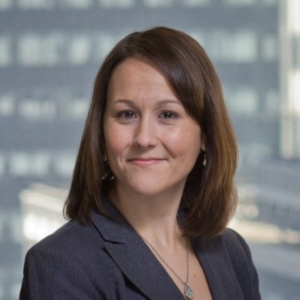 “If it’s always the loudest voiced people who are taking up space, some of the more insightful opinions get lost,” says Mariah Turner. “I like to think that I’m someone that tries to champion the softer voices in the room.”
“If it’s always the loudest voiced people who are taking up space, some of the more insightful opinions get lost,” says Mariah Turner. “I like to think that I’m someone that tries to champion the softer voices in the room.”
Turner speaks to showing up in a room and the community, as both a team player and a leader who amplifies the voices around her.
Finding Balance Within Finance
Having grown up with a father in finance, an economics degree from Harvard University, and a couple of consultative internships under her belt, Turner sought a position in investment management right out of college. More than three years ago, after a year and a half at Allstate, she joined PGIM Private Capital (PPC) and transferred from Chicago to the London office last year.
Initially drawn to sociology out of a fascination for how and why people think and behave the way they do, Turner combined her interest in human behavior with her attraction to finance. She enjoys considering why people make economic decisions and what factors influence the choices they make ̶— a valuable perspective when assessing investment prospects.
“I’m definitely someone who is intellectually curious, and in this industry, every day is different,” says Turner. “There are new challenges and discoveries with each transaction and type of company you’re evaluating. This keeps the work fresh and exciting, which motivates me to learn and do more.”
Turner notes that entering into the workforce five years ago, she knew she was looking for a balance with family and personal life – as her own parents modeled through their involvement in church, community, and after-school activities when she was growing up. “Lifestyle balance can be particularly challenging in the finance world, so what motivated me to come to PPC was knowing that I’d be in a role, in a space in finance, where I could still have that balance.”
Showing Up in a Room and For the Community
“I’ve been very fortunate in that I don’t feel that my race or gender have really been factors in my career to this point. I think it has definitely been more performance-based,” Turner notes. “I participated in speech and debate in high school, and I played sports, so I’m very used to speaking in front of people, being very direct and voicing my concerns. If I didn’t have that personality or had worked in spaces that discouraged those behaviors, maybe my experience would be different.”
Turner admits she is more wary of the possible dynamics at play around race and gender when outside of the office, in external meetings where she might not know what kind of biases are present. This means she’s more hyper-conscious of how she presents herself to get the reactions she hopes for, which could mean changing how she dresses or does her hair. Turner says, “That is something that we, as a society, are going to have to deal with on a longer-term basis.”
Turner is impressed by the leaders who walk their talk day-to-day, be it in the office or the community. “I look up to people with authenticity and passion, who convey it not just with words, but with what they do –whether it’s actively reaching out to people who are more junior, actively seeking their advice, or introducing them to committees or organizations within industries to try to broaden their vantage point.”
Nobody has role-modeled walking their talk more than Turner’s mother. As president of the school-site council, she helped Turner’s elementary school become a distinguished California school. She also began a group in the school district, whose aim was to provide support and advocate for the needs of Black parents and students. Turner observed her mom continuously play an active role in supporting the wider community, a trait she hopes to emulate.
Championing Voices and Being a Team Player
Turner would like her colleagues to see her as a compassionate leader who helps to amplify all the voices in the room.
“If I’m leading a meeting, I like to cold call on people and get a pulse for what different people are thinking, because it’s often people who are more reserved or introverted who have very deep insight,” she says.
Another way she seeks to champion differing perspectives is by having one-on-one conversations, fostering a safe space for people to share their opinions in a more private setting. From here, she can determine how to help those individuals share their thoughts in a larger space.
A rugby player while in college, Turner joined a club rugby team in London and applies the lessons she learned about teamwork from her childhood and current participation in sports.
“Everyone needs to be on the same page and playing their role, and when one person isn’t, it affects the rest of the team,” she says. “This applies to both sports and in the workplace; it is critical to have good communication and know how your actions affect others. In those times when you aren’t feeling your best, I think it’s important to ask for and are willing to receive support from your teammates.”
“I also believe it’s important to be mindful of how your teammates are feeling. Actively asking how others are feeling not only makes them feel more part of the team, but also establishes a level of trust and morale that makes everyone perform better,” she says. “Being aware of how everyone else is feeling helps form a cohesive team because at the end of the day, we’re all working towards the same goal. If one person is having an off day, that’s going to impact the whole team. Knowing how to rally around and motivate that person not only helps the individual but brings the whole team closer together.”
Turner wants to be the type of leader that helps aligns individuals’ goals to the broader team and organization’s vision, enabling everyone to move ahead and progress together.
Being Strong and Giving Back
Growing up, Turner remembers hearing stories about her father’s family working as sharecroppers in Louisiana before they moved to California, her home state.
“Only two generations back, my grandmother was picking cotton in the fields and making dresses out of flour sacks. That’s a reminder the past is not as far back as we perceive it to be.”
The wisdom Turner’s grandmother imparted has influenced her perspectives, “She told me ‘whatever your husband knows how to do, you should know how to do, too.’ Her lessons in perseverance and being self-sufficient have motivated me to be independent.”
What’s in the decade ahead for Turner? She envisions herself with a family and continuing to be led by her curiosity. In Chicago, she was highly involved in volunteering, especially working with children–whether helping to provide healthy meals or reading to them–and was struck by the impact of food insecurity in her community. She now participates in community service through the Junior League of London by helping raise awareness about poverty in the city.
By Aimee Hansen


 “I was raised with a strong work ethic, so I was well aware of the need to work hard and earn the respect of your colleagues,” says Betsy Wille, who learned throughout her career that it’s not enough to just put your head down and count on that to take care of your progression. “Ultimately everyone is responsible for their own career, and building relationships will matter.”
“I was raised with a strong work ethic, so I was well aware of the need to work hard and earn the respect of your colleagues,” says Betsy Wille, who learned throughout her career that it’s not enough to just put your head down and count on that to take care of your progression. “Ultimately everyone is responsible for their own career, and building relationships will matter.”